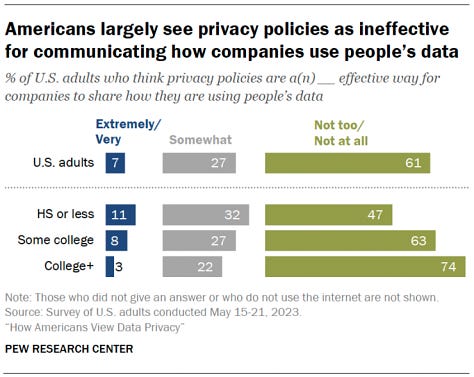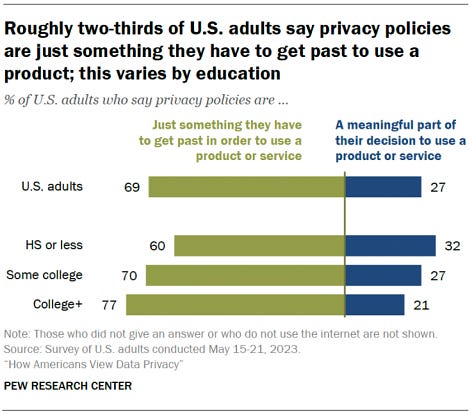Reading Website Privacy Notices is a Waste of Time
Privacy Notices are not designed to protect individuals so don't spend time reading them
Gallop released their annual findings late last year regarding Americans’ views on personal privacy matters. One of the noteworthy findings was most young adults don’t read privacy notices while a majority of older adults do read privacy notices. There was some common ground on one topic - 61% of all adults said privacy notices are not effective at communicating how a company uses personal data.
The good news for the younger adults is reading website privacy notices is (usually) a waste of time.



Welcome to another issue of Secrets of Privacy where we discuss personal privacy related topics and provide practical tips to immediately shield your personal privacy.
If you’re reading this but haven’t yet signed up, join the growing Secrets of Privacy community for free and get our newsletter delivered to your inbox by subscribing here 👇
Why are privacy notices not worth reading?
Simple - they aren’t designed to protect or help individuals. Instead, they’re legal CYA. Take it from someone who has written multiple privacy notices over the years. Privacy notices are intended to protect the website/company, not you.
You can sometimes get some useful information from a company privacy notice. Some activity is so obscene that even a standard privacy notice can’t obscure. But that’s rare since privacy notices are often broad and vague to give the website as much leeway as possible to use your data without getting in legal trouble.
And here’s the dirty little secret.
Privacy notices are just words on a screen. Most companies don’t have a good handle on how they process your data or what they do with it. And they can always do something different than what they say in the notice. How would you know until it’s too late? Or they can legally change their mind later and publish an update to the privacy notice that you won’t read.
We would argue that privacy notices are actually counterproductive to hardening personal privacy. The reason is they give users a false sense of privacy and security. It gives the low privacy-IQ person an excuse not to take any proactive steps. Whether that counterproductiveness is a bug or a feature depends on the company.
What to Do Instead




